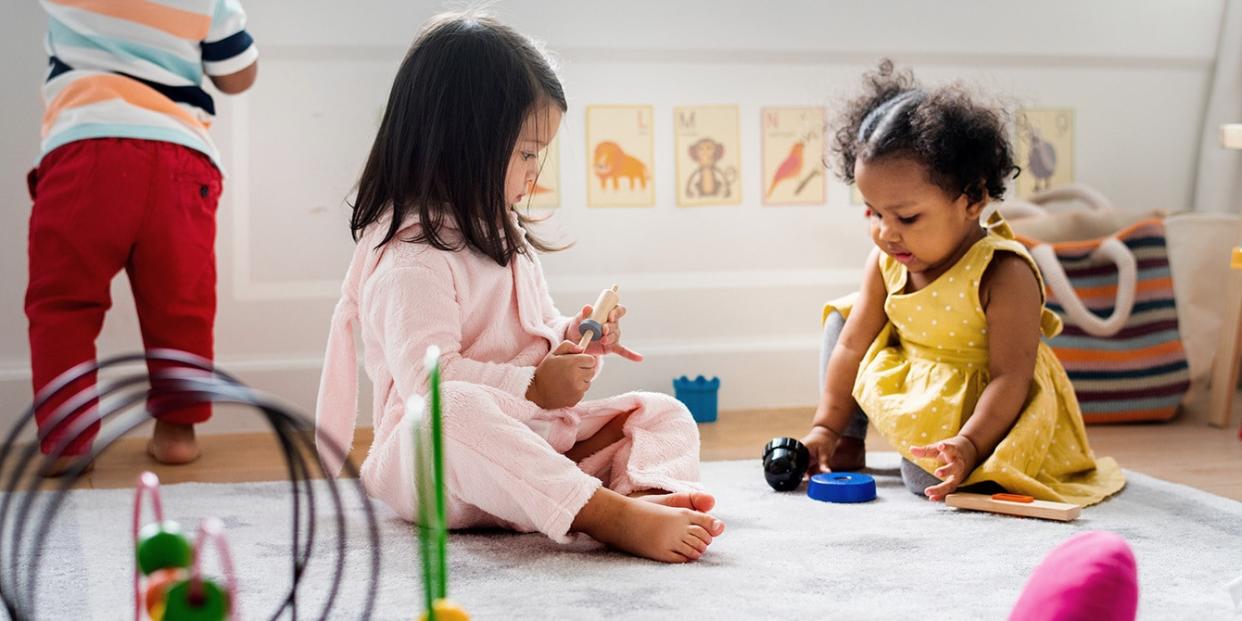New report shows daycare centers weren’t Covid transmission hubs after all

Worried about what viruses your little one may pick up in daycare center? Given that kids are likely to come down with eight to 10 colds per year by the time they turn 2, that’s only normal. Though the risk for contracting an illness (or multiple) exists, a new study finds that young kids may not have been superspreaders during the Covid pandemic.
In fact, transmission rates of SARS-CoV-2 (the virus that causes Covid) at childcare centers was only 2% to 3%. And only about 17% of household infections were from children who picked up Covid at their daycare centers. That’s compared to 50% for children and 67% for adults who were in the households and not enrolled at a childcare center.
The study was published in JAMA Network Open by experts at Michigan Medicine, the University of Pittsburgh School of Medicine, and UPMC Children’s Hospital of Pittsburgh.
Overall, the research shows that only 1 in every 20 (5%) symptomatic kids who went to daycare tested positive for the virus. In comparison, when someone in a household tested positive, the transmission was much higher, at 50% for children and 67% for adults, showing that daycares weren’t in fact Covid hotbeds.
According to the study, kids were more likely to catch the virus from a household member rather than a teacher or classmate. The low rate of infection in daycare centers could have been a result of a combination of mitigation measures, such as using cohorts, masks, improved ventilation, extra cleaning, quarantining and isolation, study authors suggest. But they also note that the long quarantine periods imposed on childcare centers to stop the spread were reported to have had a major impact on the financial viability of many schools and businesses, as well as on parents’ ability to re-enter or stay in the workforce.
Data came from 83 children in 11 childcare centers in Pittsburgh, Pennsylvania, and Ann Arbor, Michigan, as well as 118 adults and 16 other children that shared homes with the daycare-goers. Data was collected for 12 months between April 22, 2021, to March 31, 2022. (During that time, Covid vaccines for kids under 5 weren’t yet available.)
Even though the data suggests daycare centers weren’t a breeding ground for Covid transmission, experts still recommend kids receive a Covid vaccination—especially the updated monovalent vaccines that can better protect kids against the currently circulating viral strains.
The Centers for Disease Control and Prevention (CDC) noted that Covid-related hospitalizations in kids under 5 were increasing during the fall, which could be due to the fact that the majority of kids in this age group haven’t yet received vaccination against the virus.
As of May 2023, when the public health emergency was lifted, just 13% of kids aged 6 months to 4 years had received at least one dose of a Covid vaccine.
“We strongly recommend the COVID-19 vaccine for young children to disrupt the high rates of transmission that we saw occur in households that can lead to missed work and school,” said Andrew Hashikawa, MD, clinical professor of emergency medicine. He also recommends shortening quarantine periods.
“While it’s crucial to remain vigilant in our efforts to manage the spread of SARS-CoV-2, it seems that prioritizing testing and extended exclusion periods for children in child care centers may not be the most practical approach, as it can place undue financial burden on families from frequent testing, result in missed work, and hinder children’s critical access to quality care and education,” Dr. Hashikawa added.
“Our findings support relaxing SARS-CoV-2 testing and exclusion recommendations for mildly symptomatic or exposed children,” the authors of the study said, noting that the recommendations could be more aligned with those of flu and RSV as Covid becomes more of a regular fixture in virus season.


